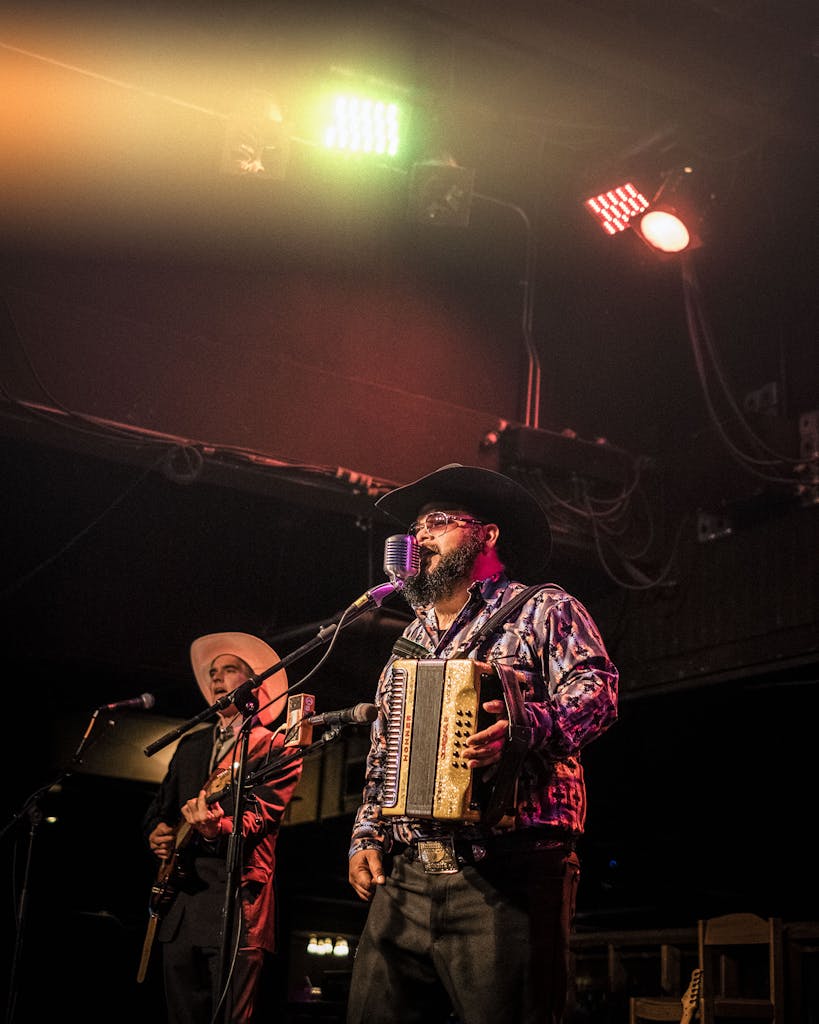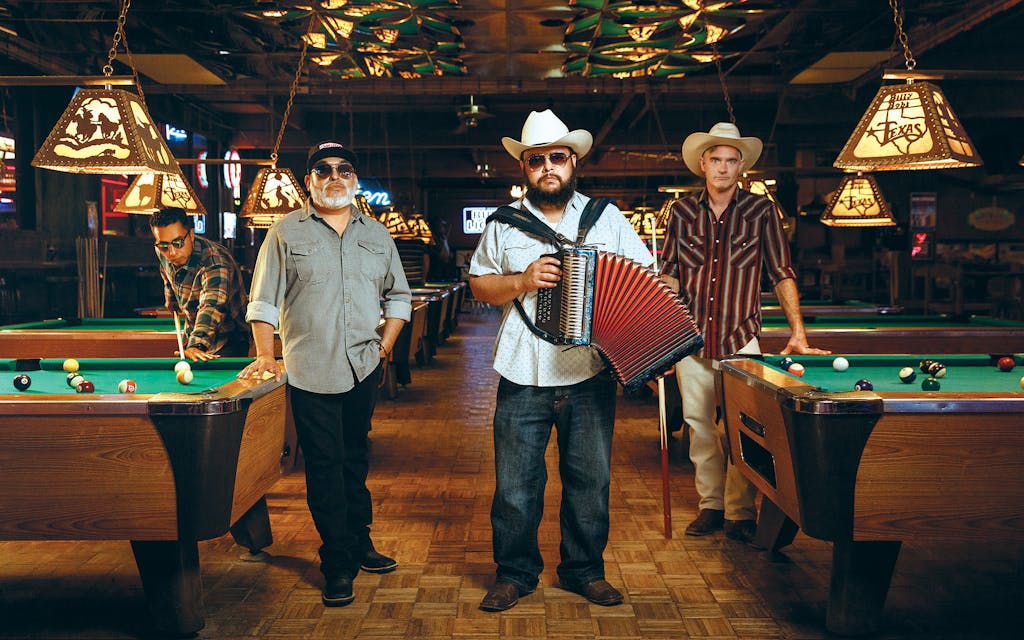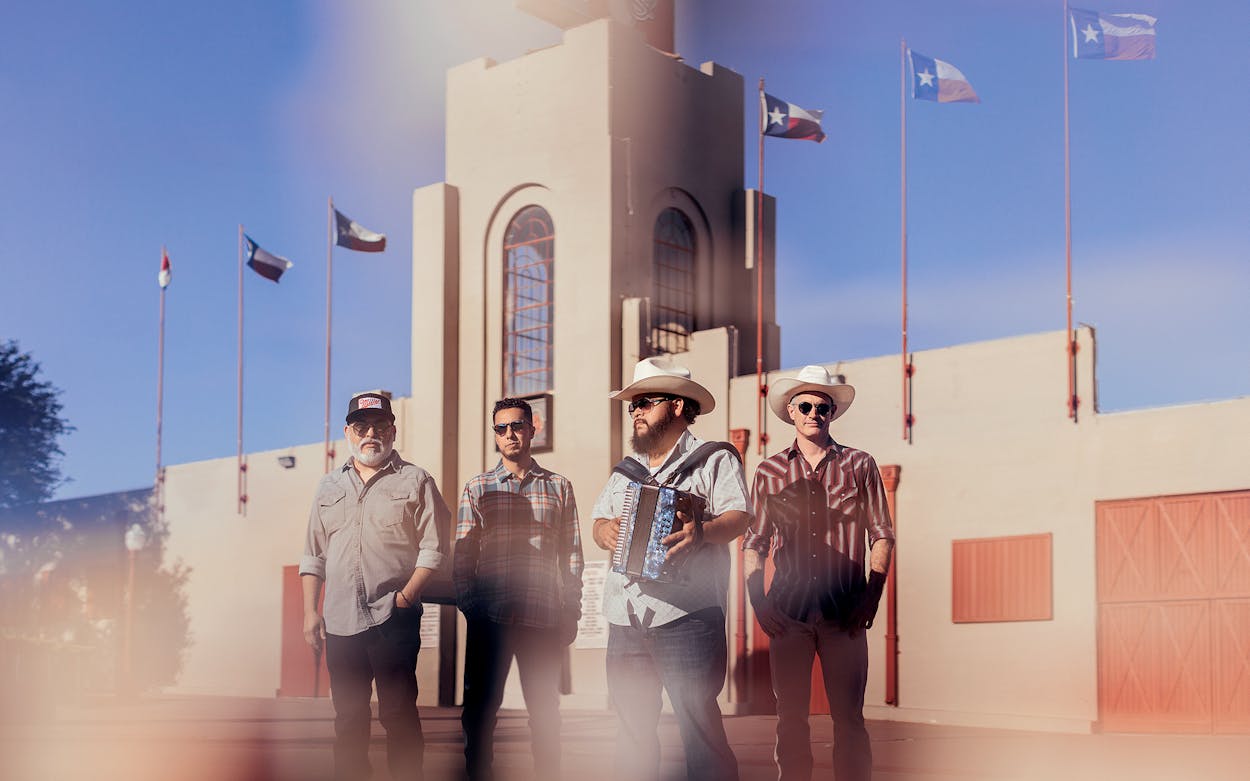The Squeezebox Bandits were halfway through a three-hour set in February when they decided to reintroduce themselves. The sound quality at Second Rodeo Brewing, a spacious beer garden in a recently redeveloped area of the Fort Worth Stockyards, wasn’t great that day. For much of the first half of the show, the band’s singing was barely audible over the din of beer orders and chatter, and front man Abel Casillas looked like he was trying to nudge more volume out of his accordion by thrusting his hips to one side or the other with every squeeze of the instrument.
Gradually, the crowd started paying attention. Conversations grew quieter. Feet were tapping. Heads were nodding along. Some attendees might have perked up when they heard the band perform “Wasted Days and Wasted Nights” by the late San Benito legend Freddy Fender. Some might have started to realize the short, stocky man who sported a big dark beard, a pearl-snap shirt, and a pair of aviator sunglasses below a baseball cap was no novelty act. They might have noticed that he was a damned good accordion player. They might even have mistakenly described the band’s music as tejano.
The Bandits had the audience right where they wanted it. “Once again, we’re the Squeezebox Bandits,” Casillas told the crowd. “That being said, here’s a little George Strait.”
Plenty of Texas honky-tonk acts know to leave Strait’s music to King George himself. But in the right hands, an accordion has a way of turning listeners into dancers. By the second verse of “The Chair,” Strait’s 1985 hit single, the Bandits managed to fill the area near the stage with two-steppers: couples, a father and teenage daughter, a woman still talking on her cellphone as her partner dipped her so low that her head nearly scraped the floor, an older man dancing by himself. A sign stuck on a piano read, “Texas Music—Free. Nashville Pop—$10.”

This is how a lot of the band’s gigs play out. They start as background music. They finish with just about everyone on their feet—and many asking where they’ll be playing next.
Two weeks earlier, I’d met Casillas at a nearby coffee shop and asked about his proudest moments as a musician. The 41-year-old leaned back and paused. He named a show he played in Luckenbach, signing with State Fair Records, and sharing the stage with Jack Ingram—but he lingered on the smaller victories. “Getting people to like what we do, that’s a great feeling,” Casillas said. “They might chuckle and say, ‘The accordion?’ Then, before you know it, they’re following us, and I see them at another gig because they never heard anything like it.”
Casillas and the band stay busy. They’ve played about four nights a week for the past five years. Brooks Kendall Jr., who books shows for several venues in Fort Worth and Dallas, including Fort Brewery and the Post at River East, said, “I know that I can rely on them to bring people out.” Kendall has also booked on behalf of local festivals and events. “They definitely have become maybe the most-asked-for local band.”
What Casillas is doing musically is at once familiar and unorthodox. He’s taking honky-tonk music and adding a flair he honed while playing in tejano bands. He makes country and western songs fun for fans who already cherish them as well as for those who thought they didn’t like the genre. The next question for the band, after releasing its third album in May, is whether it’s ready to take its talents beyond North Texas.
The tejano scene was thriving in the early nineties, and in the North Side of Fort Worth, near where Casillas grew up, high school events often featured bands with an accordion player. Casillas wanted to be that player, with the instrument that stood out both visually and audibly. But at sixteen, he couldn’t afford an accordion. So, he got jobs at Winn-Dixie and Carnival Grocery stores specifically to save up for one. When Casillas’s father saw how diligently he was saving his money, he volunteered to contribute—on the condition that his son devote himself to learning and practice.
At first, Casillas couldn’t find anyone to teach him how to play. A custodian at Diamond Hill–Jarvis, a predominately Hispanic high school, suggested his brother, Frank Castro, who was one of the best players in town. Castro gave Casillas lessons, mostly teaching him polka tunes, for about a year. Then Casillas took a class and learned how to play tejano music. “When I got the accordion, I never really thought of doing country with it,” Casillas said. “Tejano music was really hitting hard. It was when Selena was alive.”
It was classic honky-tonk music, though, that Casillas’s father most loved, and that he himself most often listened and sang along to. Casillas grew up with Hank Williams’s high warble and Don Williams’s sultry baritone and everything in between. (His own voice is closer to Don’s side of the spectrum.) He’d sneak into City Streets Night Club in downtown Fort Worth as a teen for karaoke; his go-to song was Strait’s “Right or Wrong.”


Casillas’s separation of the music he was listening to from the music he was playing was understandable. In the Southwest, the accordion is most often associated with tejano, but the instrument spans genres. German, Czech, and Polish settlers brought it to Texas in the mid-1800s to play polka. Soon after, Texas Mexicans, many of them migrant workers, picked up the accordion and adapted the polka into a sound that would become conjunto. The instrument’s tones and range made it extremely versatile. Even if a band was missing some of the instruments typically used to play conjunto, having a skilled accordionist could enable it to fill a room with festive music.
Casillas studied business management at the University of Texas–
Arlington until 2006 and then spent the better part of a decade playing in various tejano bands in the Fort Worth area. But classic country earworms were what he’d always be humming to himself. It was around 2014 that he decided to use his accordion to front a honky-tonk band. “I was trying to really bridge the style of music I’ve played so long with the style of music that I’ve been wanting to sing,” Casillas said. After a period of experimentation, he formed the Squeezebox Bandits in 2017.
The band settled into its current lineup three years ago. Austin Gardea plays bass guitar. At 32, he’s about a decade younger than the rest of the band. He looks like a skinnier, more youthful version of Casillas, and he usually wears a slight, happy-to-be-here smile on his face onstage. Matt Calderon played the timbales and bongos in a tejano band with Casillas more than two decades ago before taking over the drums for the Bandits. With a gray five-o’clock shadow, he looks like he’s spent a lifetime in a bar band, though he has also built a second career as a pediatric nurse. Geoff West, who works as a home inspector, is the only non-Latino guy in the band and its most recent addition. He has a wiry frame and silver hair often covered by a cowboy hat; he looks like he might be a regular at the types of establishments the Bandits play. West ran into Casillas on a Saturday night in 2019. Casillas mentioned the Bandits needed a guitarist, so West showed up for a set at Wild Acre Brewing, in Fort Worth, looking like he was still hungover from the night before. But his ability to incorporate chicken picking with the accordion won the group over.
“I want people to know that I’m not dismissing tejano, but it’s not tejano,” Casillas said. “It’s country.”
The Bandits’ first two albums, 2018’s Clear As Day and 2019’s Sounds of Texas, were self-recorded and self-produced. Clear As Day is largely a showcase of Casillas’s accordion skills; “Latin Smoke” is a romantic tune with no lyrics, carried by seductive exchanges between the accordion and electric guitar. You can almost sense Casillas’s lingering trepidation to dive into country and western music. Much of the album leans into something closer to zydeco, the eclectic Louisiana genre created by French Creole speakers. It is on the album’s title track that Casillas finally puts to use that country and western voice he’d trained at karaoke joints.
By the following year, when the band released Sounds of Texas, he had overcome any hesitation. The sophomore album is filled almost entirely with covers of country songs made famous by Texas icons: Charlie Walker, Ernest Tubb, and even the Texas Tornados, a country and conjunto supergroup that included Freddy Fender and Flaco Jimenez, among others, whose style is perhaps most approximate to the Squeezebox Bandits’. And, of course, there’s Strait’s “Right or Wrong.”
The band released its third album, Check to Check, on May 5—its first recorded with a label, Dallas-based State Fair Records. It was produced by Paul Williams and Matt Hillyer, the longtime front man of Eleven Hundred Springs, a beloved Dallas country band that cut its teeth in Deep Ellum in the early aughts. Eleven Hundred Springs was influenced by the Texas Tornados, so Hillyer felt a kindred connection to the Squeezebox Bandits.
“They’re a country band,” Hillyer said. “They’re a blues band. At times, they’re a conjunto band. They’re a rock and roll band sometimes. They blend it all together in a way that’s all their own.” Still, Casillas wants the songs he’s singing to be recognized for what they most clearly are. “I want people to know that I’m not dismissing tejano, but it’s not tejano,” Casillas said. “It’s country.”

If you want to see Casillas look embarrassed, don’t just ask him about all the shows his band is invited to play in Fort Worth and Dallas. Ask him if he always says yes. “I do,” Casillas said sheepishly. The Squeezebox Bandits have played as far from home as Las Vegas, Nashville, and Broken Bow, Oklahoma, but the band makes its living playing in the Metroplex, where it can reliably attract crowds. It might play a Saturday night set at the Rustic, in Dallas. Then a three-hour Sunday afternoon gig at Sundance Square, in Fort Worth. Then a Tuesday happy hour performance at a Fort Worth taco shop. Then a crawfish boil organized by a Dallas radio station.
“To be honest, it’s been difficult recording because their schedule is so packed,” Hillyer told me. It’s something Casillas is working on. “It feels like it’s coming to that point where I need to not do them all,” Casillas told me. “Be selective a little bit. But still, it’s like, there’s that money on the table.”
Only Casillas and Gardea make their sole incomes from the band; the others have day jobs and join the group mostly on weekends (Casillas and Gardea play two-man sets the other days). And Casillas has a seven-year-old son with his wife. “You don’t want to go out on the road and make a couple hundred bucks when you can make a couple hundred bucks down the street,” Casillas said. Still, he adds, “I’m really looking to branch out after this album and get on the road a little more.”
Last year, Eleven Hundred Springs performed in Luckenbach, about ninety minutes west of Austin, at the dance hall made famous by Jerry Jeff Walker, Waylon Jennings, and Willie Nelson. The Springs brought the Squeezebox Bandits to open the show, and the band was embraced by audience members, most of whom hadn’t heard it before. “It kind of speaks to what I hope for them,” Hillyer said.
On May 5, the Bandits celebrated the release of their third album by headlining at the “World’s Largest Honky Tonk.” There are only a handful of country music venues that make musicians feel that they have made it. Some are in or near Austin. Some are in Nashville. But Billy Bob’s Texas, the one that saved a spot on its calendar for the Squeezebox Bandits, is located in the Fort Worth Stockyards, a few minutes from where Casillas grew up.
Booking Billy Bob’s gave the Squeezebox Bandits all the cred the band needs to hit venues across the state and outside it. Wherever you live, you might be dancing soon enough.
Jonny Auping is a freelance writer based in Dallas. His work has appeared in the Dallas Morning News, the New Yorker, and D Magazine.
This article originally appeared in the July 2022 issue of Texas Monthly with the headline “Accordion, Strait Up.” Subscribe today.
- More About:
- Music
- Country Music
- Fort Worth
- Dallas







